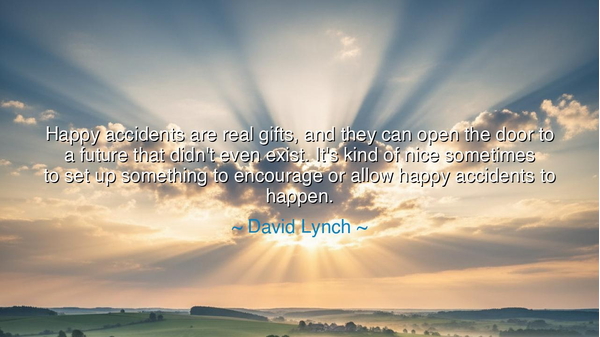
Happy accidents are real gifts, and they can open the door to a
Happy accidents are real gifts, and they can open the door to a future that didn't even exist. It's kind of nice sometimes to set up something to encourage or allow happy accidents to happen.






The words of David Lynch—“Happy accidents are real gifts, and they can open the door to a future that didn’t even exist. It’s kind of nice sometimes to set up something to encourage or allow happy accidents to happen”—speak as both an artist’s confession and a philosopher’s revelation. In them lies an ancient truth wrapped in modern simplicity: that creation is not born solely of control, but of openness to mystery. Lynch, a master of the strange and the sublime, reminds us that life’s greatest breakthroughs often emerge not from precision, but from serendipity—the gentle hand of chance that we must learn to trust. His words call us to humility, for they teach that the world does not always move according to our designs, yet it moves toward beauty when we allow it.
In the ancient world, this idea was understood as divine chance—the unseen order that guides the unexpected. The Greeks spoke of Tyche, goddess of fortune, who could bless or ruin in a single breath. The wise did not curse her whims; they learned to dance with them. In the same way, Lynch invites us to become co-creators with the unknown—to set the stage, but not to script every line. For even the gods, it was said, admired the one who could see opportunity in chaos. A happy accident, then, is not mere luck—it is the universe whispering, “Pay attention, for something greater than you intends to happen.”
The origin of Lynch’s thought lies in his own creative journey as a filmmaker and artist. In his world of storytelling—where light, sound, and imagination weave together—mistakes often become masterpieces. A flicker of shadow, a distorted sound, a forgotten line: these, in his vision, are not errors but portals. They open to realms unseen, guiding him to stories that logic could never have conceived. One might recall that during the filming of Blue Velvet, a malfunctioning light inspired an entire mood of haunting beauty; or that an actor’s improvisation transformed an ordinary scene into a timeless moment. Such events cannot be planned—they are gifts, and only the receptive mind can recognize them as such.
The ancients would see this as the art of flow, the surrender of the ego before the divine rhythm of the world. The Taoist sages of the East taught this principle under another name: Wu Wei, or “effortless action.” It is the wisdom of the river that carves valleys not by force, but by yielding. Lynch’s message is the same—set your intention, yes, but allow the current to carry you. When you cease to grasp at perfection, you create space for the miraculous. To the rigid, chance is a threat; to the wise, it is a blessing in disguise.
History offers many examples of the happy accident shaping destiny. When Alexander Fleming left his petri dishes unattended and later discovered penicillin, he could have cursed his carelessness. Instead, he recognized the gift in the mistake—and saved millions of lives. When Christopher Columbus sought a route to Asia and found the Americas instead, history shifted. Even the invention of the microwave oven, born from a scientist’s melted chocolate bar, testifies that discovery often hides in disorder. Each of these moments mirrors Lynch’s truth: the future that “didn’t even exist” can burst into being when the mind remains open.
Lynch’s wisdom also teaches a gentler art—the art of encouraging chance. To “set up something to allow happy accidents” is to cultivate the soil of possibility. The painter leaves a canvas half-finished to see what the next brushstroke reveals; the writer begins without knowing the ending; the scientist experiments without fear of failure. The key is not chaos, but trust—a willingness to meet the unknown halfway. Those who live this way find that life itself becomes more alive, more playful, more divine. For creation, at its highest, is not a command but a conversation between the mind and mystery.
Thus, my child, take this teaching to heart: do not curse the unforeseen. When your plans unravel, when mistakes arise, pause and look deeper—perhaps destiny is rearranging the pattern for your good. The wise do not cling to control; they prepare the ground and then let life surprise them. In your art, your work, and your heart, leave room for the accident that may reveal a truth larger than your imagination.
So remember the words of David Lynch: “Happy accidents are real gifts.” Treat them as sacred messengers, not intruders. Set your intentions with care, but hold them lightly, like a bird in the hand. In doing so, you invite the universe to dance with you—to create not what was planned, but what was meant to be. For in the end, the most wondrous futures are not built by certainty, but discovered in the shimmering chaos of divine chance.






AAdministratorAdministrator
Welcome, honored guests. Please leave a comment, we will respond soon